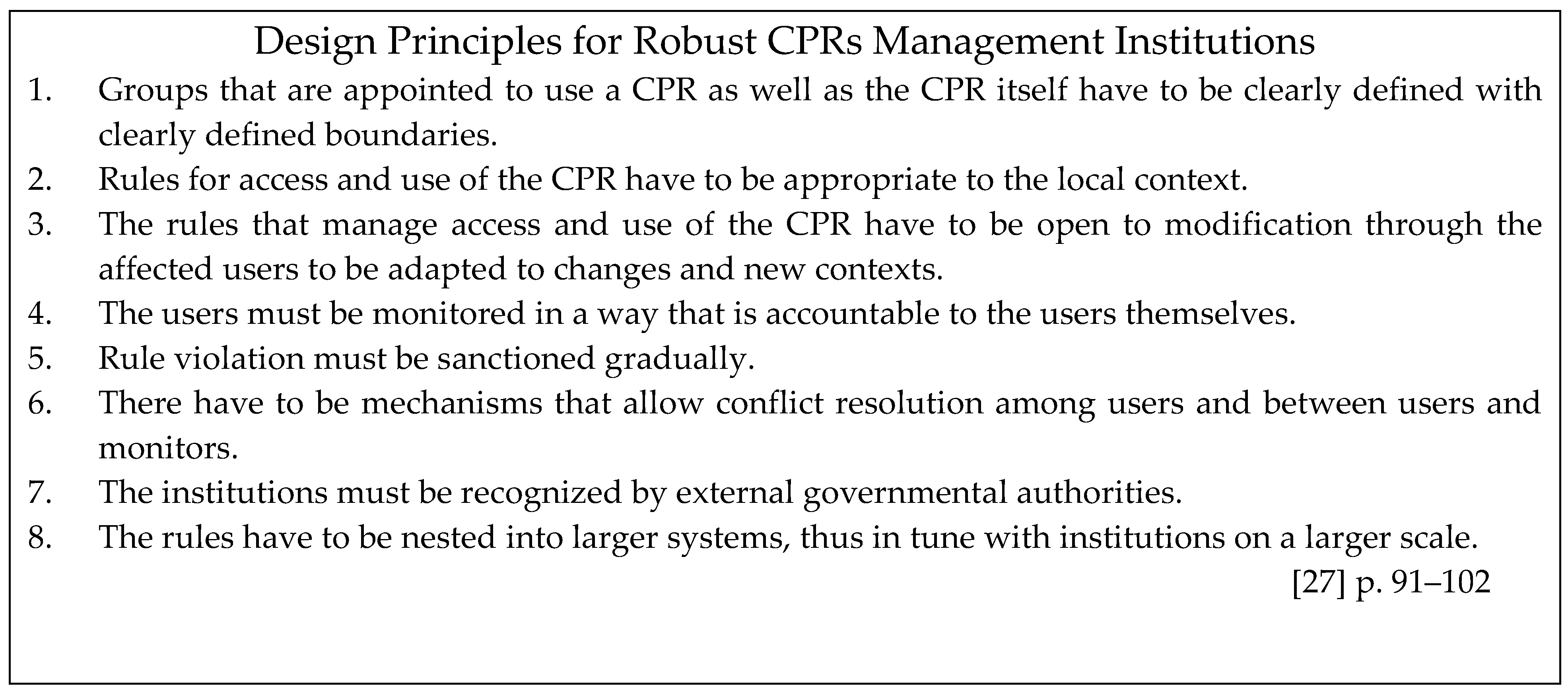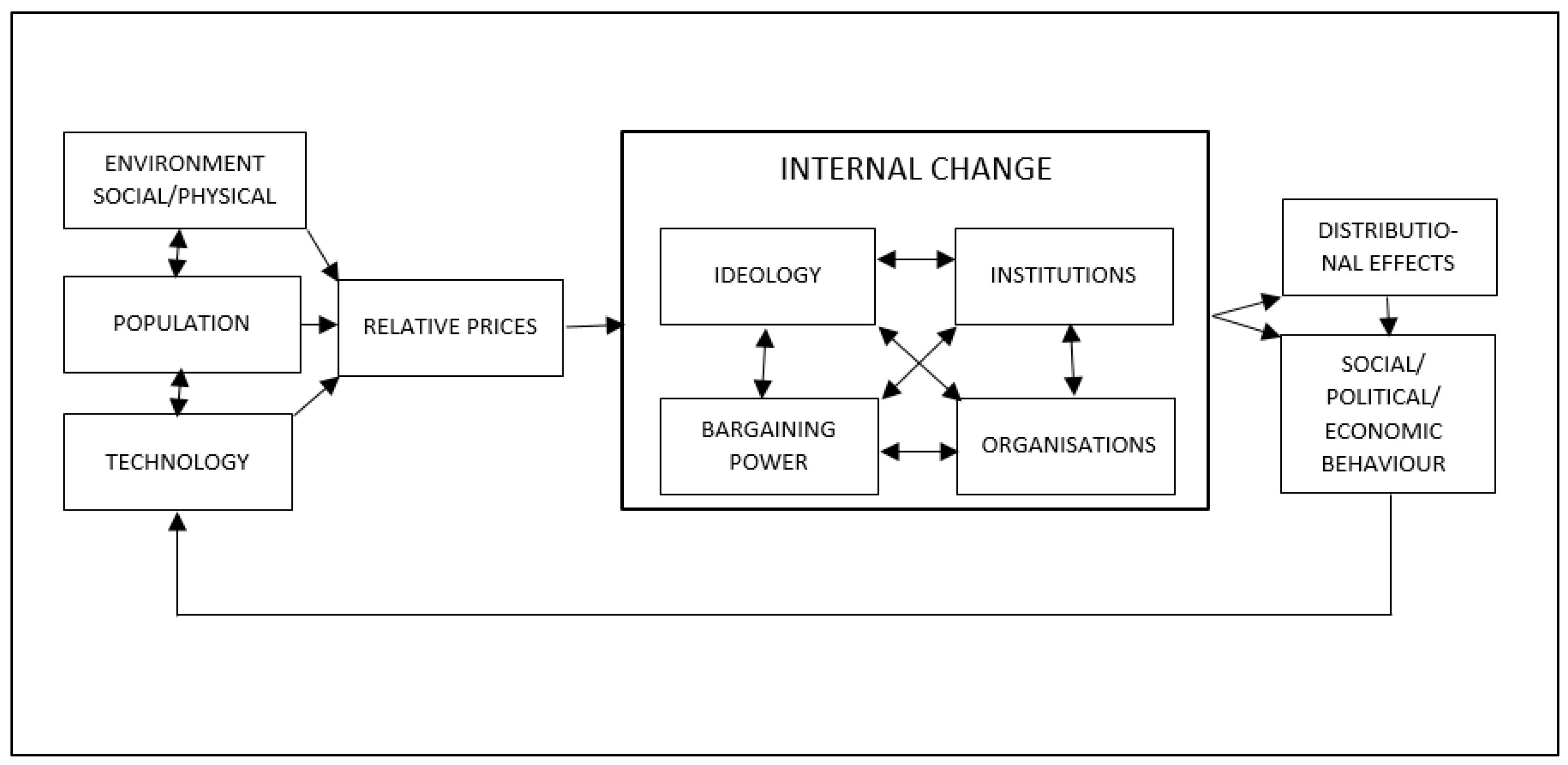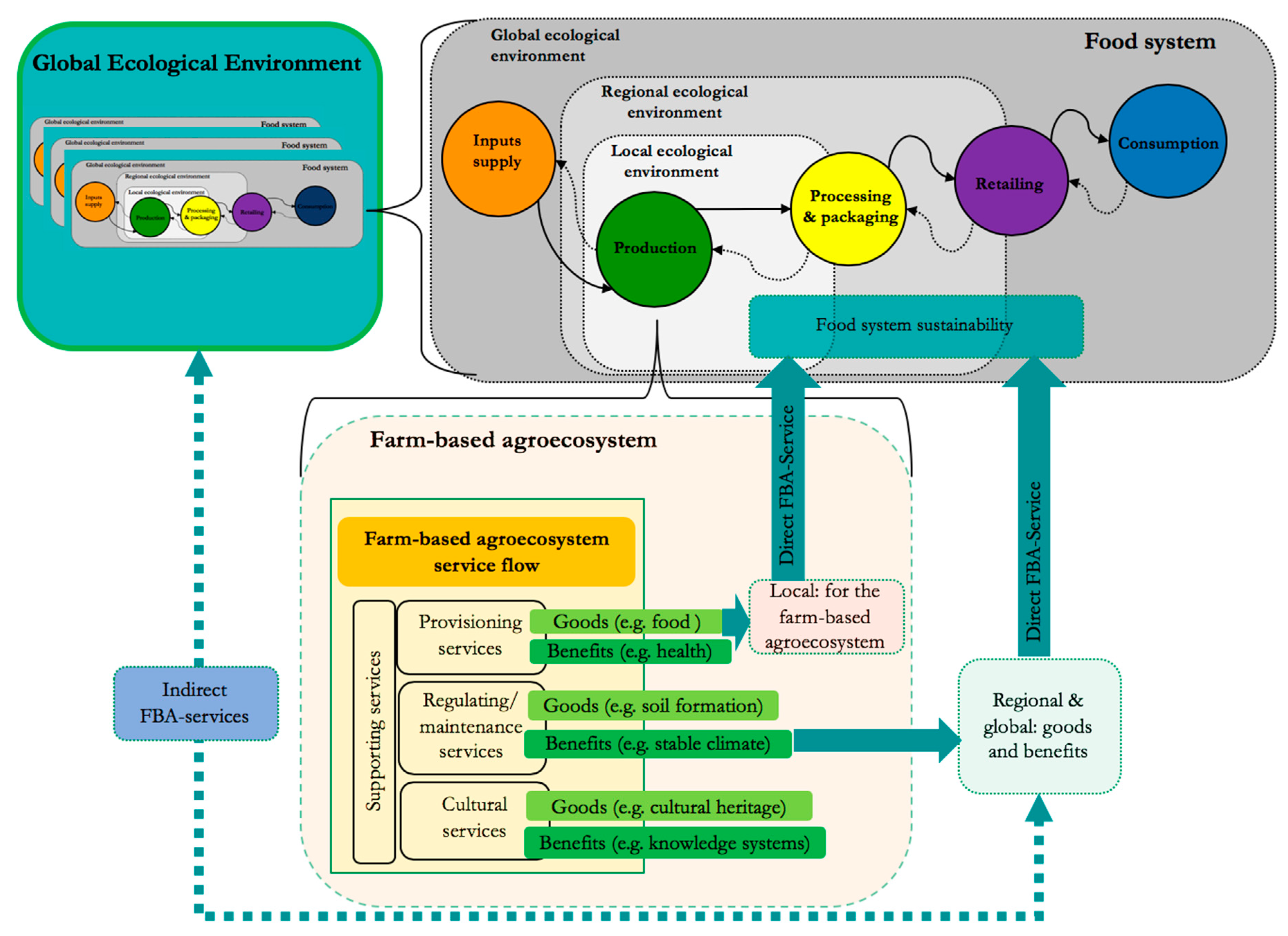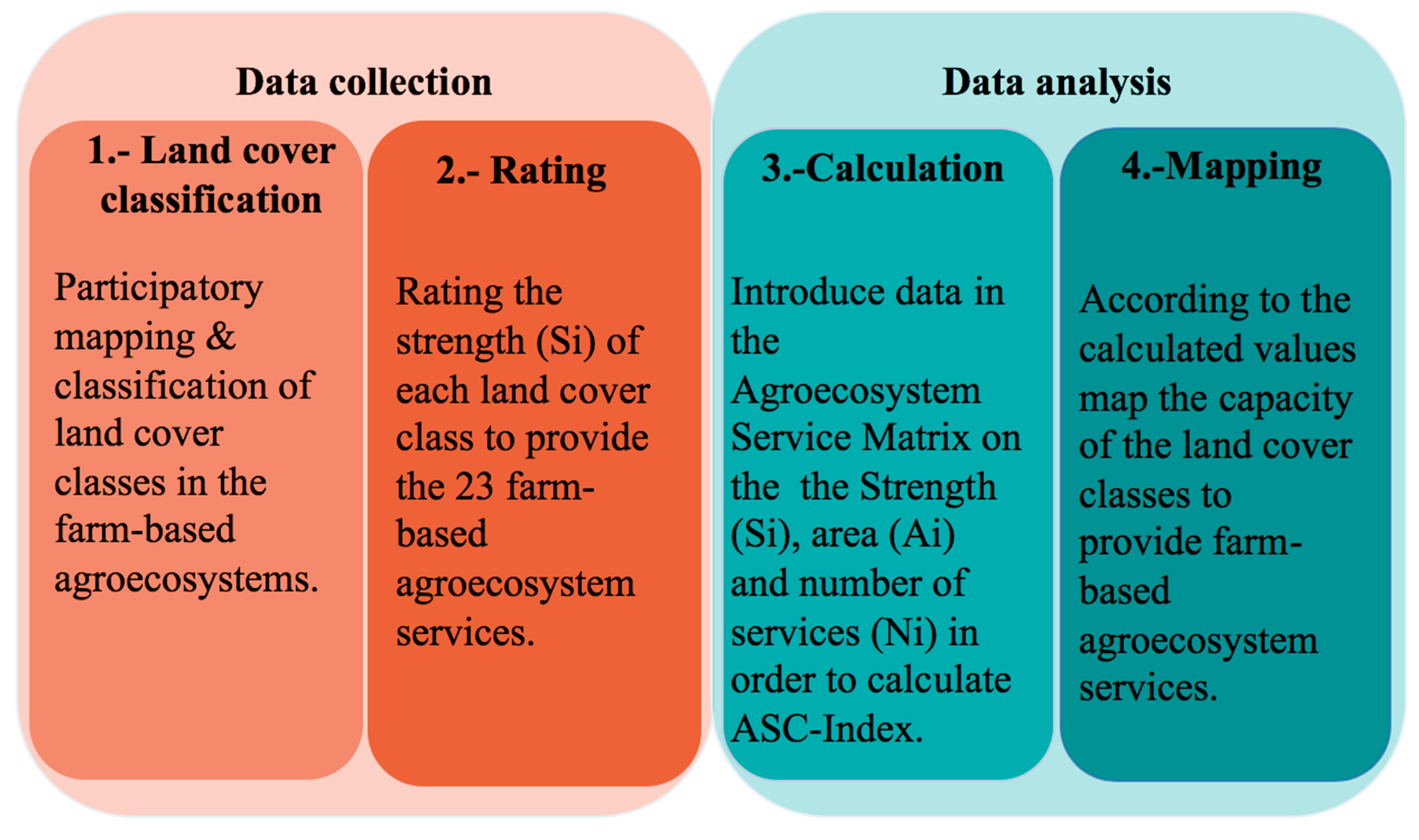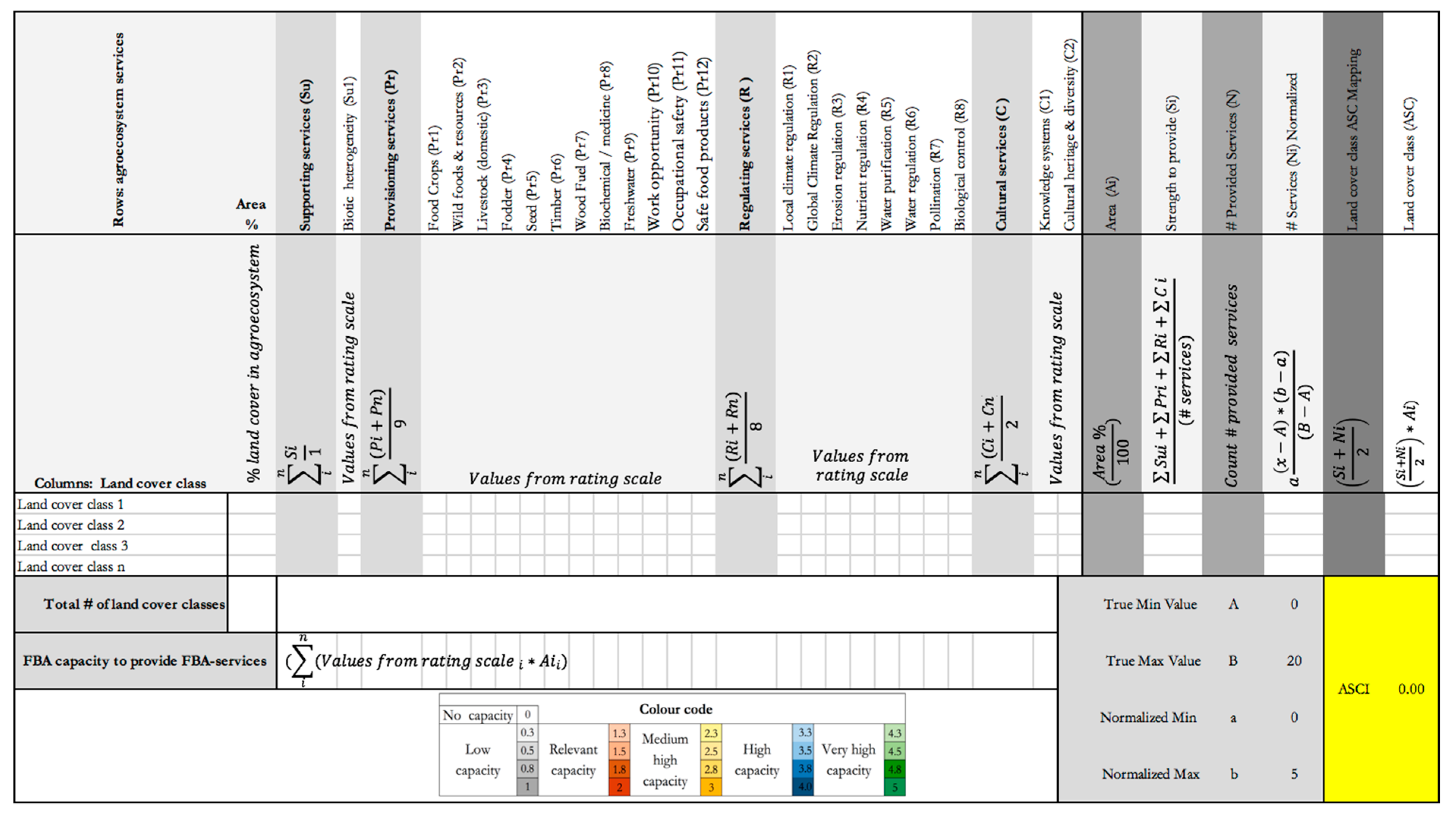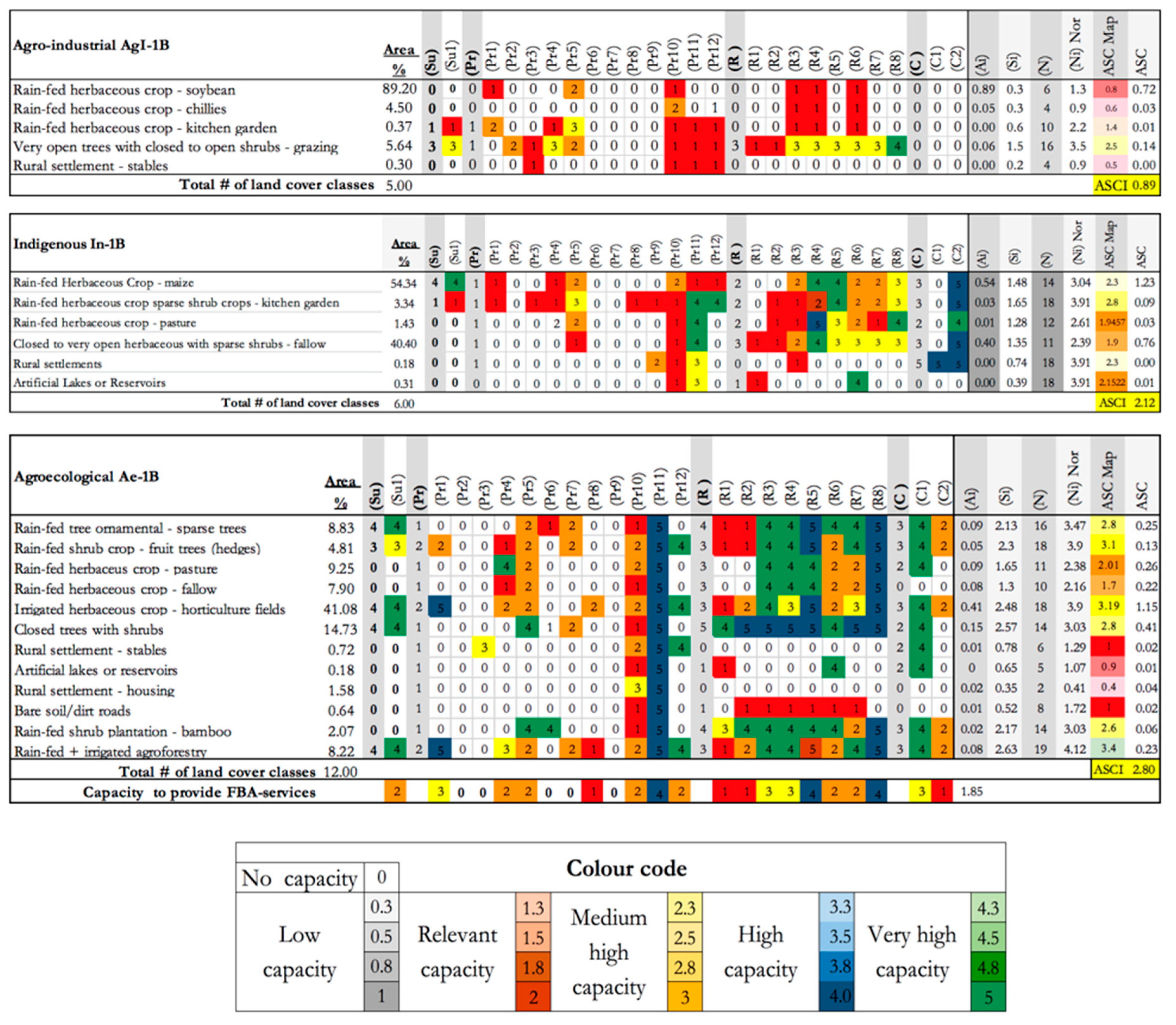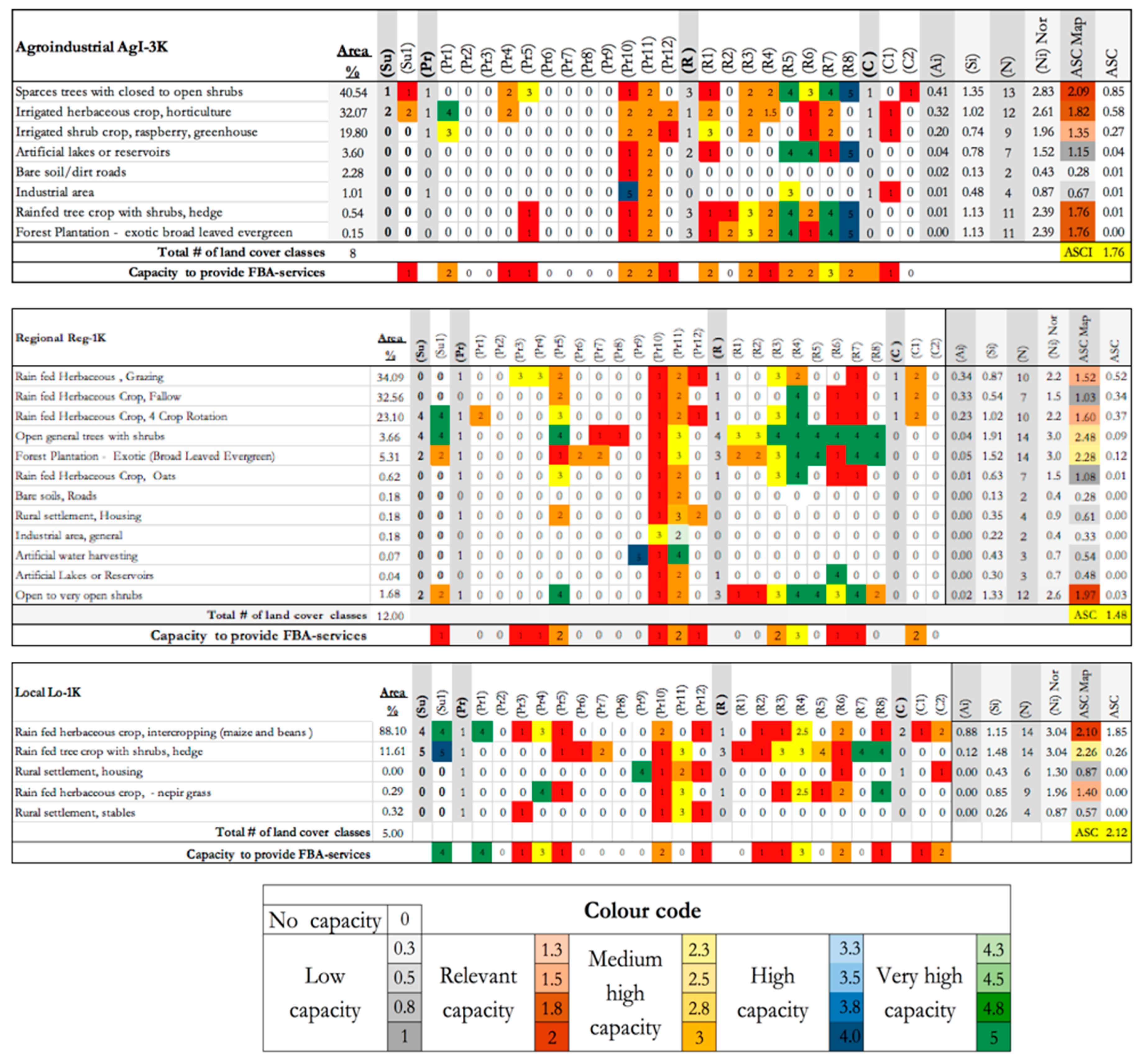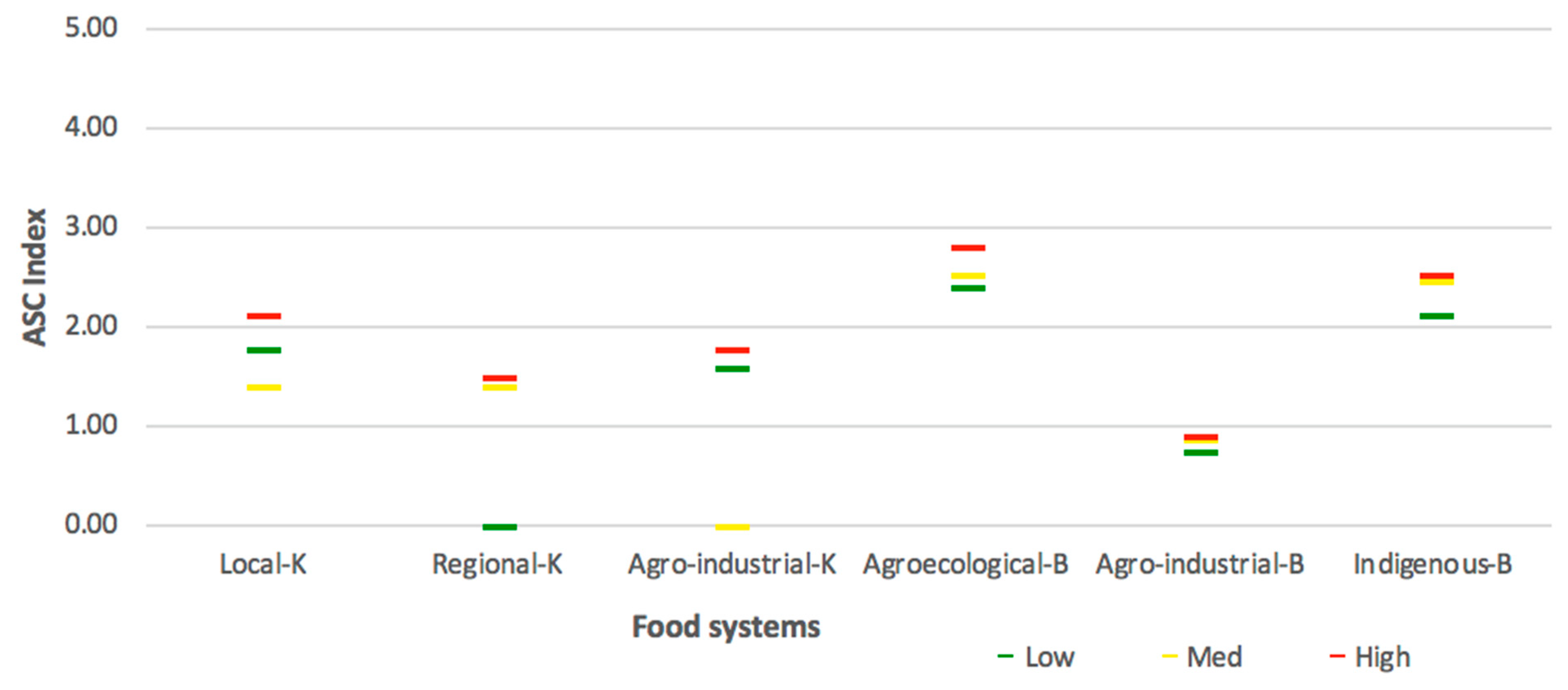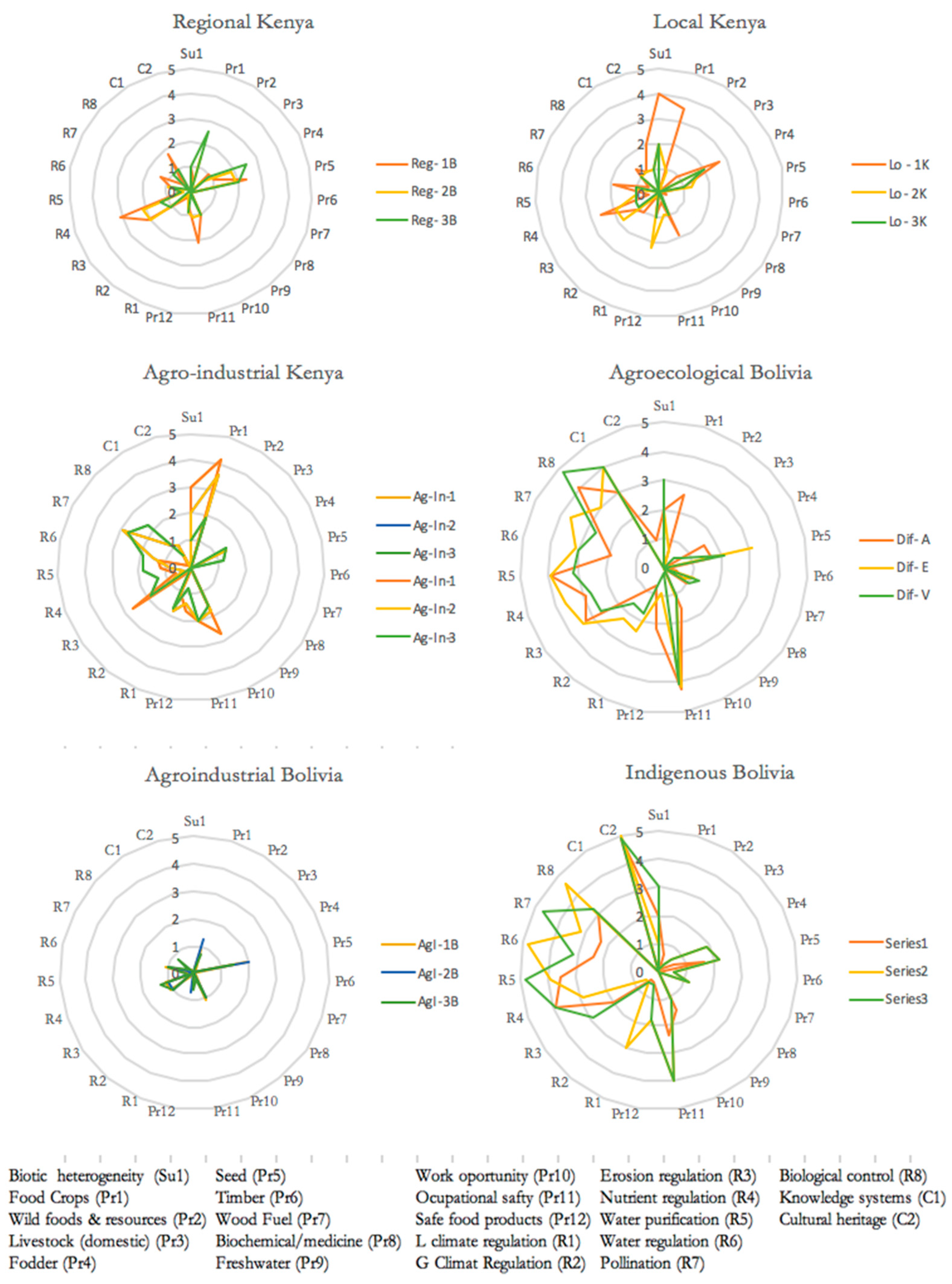Abstract
The ongoing expansion of agro-industrial food systems is associated with severe socio-ecological problems. For a closer look at the socio-ecological impacts, we analyze the capacity of six food systems to provide farm-based agroecosystem services with the Agroecosystem Service Capacity (ASC) approach. At the same time, we analyze how food systems affect the management of common pool resources (CPR). Our findings show that indigenous peoples and agroecological food systems can have up to three times the ASC-index of agro-industrial food systems. Through their contribution to the sustainable management of cultural landscapes with robust institutions for the management of CPRs, food systems contribute to socio-ecological integrity. On the other hand, regional and agro-industrial food systems with a lower ASC-index contribute less to socio-ecological integrity, and they undermine and open up common property institutions for robust CPR management. As a result, they appropriate (or grab) access to CPRs that are vital for food systems with higher ASC-indexes resulting from a robust management of CPRs. Strengthening a robust management of CPRs could put a halt to the ongoing expansion of food systems with a low ASC-index by replacing them with a high ASC-index to prevent an exacerbation of the current socio-ecological situation.
1. Introduction
Food system activities, such as the provision of inputs in the form of pesticides, genetically modified organisms (GMO) seeds, the production of food as well as the following steps of processing, retail and consumption, have caused severe socio-environmental impacts by degrading the quality of natural resources and ecosystems. However, food systems and their related activities still have a strong potential to solve these problems by providing benefits and services to society and to the environment [1].
Food system activities include more than just the production of food. According to Colonna et al., a food system is “an interdependent network of stakeholders (companies, financial institutions, public and private organizations), localized in a given geographical area (region, state, multinational region), participating directly or indirectly in the creation of a flow of goods and services geared towards satisfying the food needs of one or more groups of consumers” [2]. A food system extends from food production through food processing and distribution to food consumption or utilization of food (Figure in Section 1.1.2). Foley, DeFries [3] and Tilman, Cassman [4] have shown that food production is the main food system activity that has modified Earth’s terrestrial land cover, reaching 40% of the Earth’s surface. Food production occurs in so-called agroecosystems and has transformed parts of natural ecosystems geared towards food production [5]. Agroecosystems rely on natural resources that have been managed historically through common property institutions and can as such be viewed as common pool resources (CPRs). Today, agroecosystems and their links with the larger ecological environment and cultural landscape ecosystems are managed through state, private and common property regimes.
Food production is the most obvious ecosystem service provided by agroecosystems [6]. However, agroecosystems can also provide other agroecosystem services, such as soil nutrient recycling, regulation of local and global climate or opportunities for resilient livelihoods [7,8]. These additional services benefit the environment (locally and globally), the sustainability of food systems and the resilience of the involved actors. In this paper, we analyze how food systems affect the management and maintenance of CPRs.
In general, farmers are the main managers of globally usable lands by using intensive and extensive technologies; hence, they have shaped the surface of the Earth in a way that (as Ellen [9] argues) there is no so called pure nature remaining. Rather, we face a high diversity of cultural landscape ecosystems [4,10]. Management decisions regarding farming practices affect the sustainability of food systems and the integrity of the ecological environment. How farmers and other actors manage farms and agroecosystems and the previously described additional contribution is influenced by property regimes and regulating institutions that are embedded in larger institutional settings. These property regimes that regulate institutions and institutional settings are subject to transformations over time [11,12]. Generally, there is a trend towards the commodification, privatization and fragmentation of former interlinked common property institution settings [12,13]. Adherents of a more neo-liberal development discourse see investments in the agriculture as an opportunity for modernizing the backward agriculture in underdeveloped countries that helps to meet the rising global demands for agricultural products and a general development of these countries (these ideas build on Rostow’s [14] assumption for economic growth). On the other hand, critics warn that the neoliberal development discourses behind such investments veil negative impacts caused by such investments (e.g., management transformations that lead to a concentration of power or the fragmentation and commodification of commonly managed agroecosystems). These transformations, fragmentations and commodification of common property regimes reduce the ability of food systems to provide services for environmental integrity and food sustainability (these ideas build on Ferguson’s [15] analysis of anti-politic machines). The use of CPRs without contributing much towards their availability is a form of “commons grabbing” (the acquisition of CPRs that are provided by others). The acquisition of CPRs or the missing contribution to the maintenance of CPRs reduces their availability. The resilience of those contributing to the CPRs is grabbed by those who acquire the CPR and do not contribute to their generation or maintenance.
To better understand farm-based agroecosystems and how they can contribute to solving the socio-environmental challenges that humanity faces today with regard to the collective use of natural resources and ecosystems, we conceptualize agricultural landscapes as agroecosystems and farms as farm-based agroecosystems. This enables us to acknowledge that every piece of land on Earth has a role with regard to the use and management of natural resources and ecosystems and that humans can attribute roles to parts of these land cover classes, mostly those agricultural landscapes and farm-based agroecosystems. This ties to the Gaia hypothesis by Lovelock that argues that Earth is a self-regulating system where each component (living and non-living) has a fundamental role that can radically affect the living condition on Earth [16] (i.e., every living organism and non-living thing has a function and a capacity to contribute to the well-being of a larger system; i.e., a land cover class contributes to the sustainability of a farm-based agroecosystems). The farm-based agroecosystems contribute to the sustainability of food systems, which can contribute to the commonly used and managed global ecological integrity of the planetary system.
There is a growing body of literature on studies that assess sustainability of food systems [17], the multifunctionality of agricultural landscapes [18,19,20,21,22] or cultural landscape ecosystems [9,10]. We use the Agroecosystem Service Capacity (ASC) approach [23] that allows comparing different farm-based agroecosystems and their capacity to provide agroecosystem services. The ASC-index approach was inspired by the paradigm shift suggested by Perfecto, Vandermeer and Wright [24], which integrates conservation and agriculture in high-quality landscape patches [23].The ASC-index is grounded on the methodological approach of Burkhard, Kroll [25] that study landscapes’ capacities to provide ecosystem services [26]. We selected the ASC-index framework because: First, it allows us to assess farms not solely as units of biomass production, but as comprehensive components that have the capacity to produce biomass as well as other farm-based agroecosystem services [23]. Second, the ASC-index uses data that is generated at the farm level with semi-structured interviews and visual tools for soil assessment. Last but not least, the ASC-index allows us to create maps that can help visualize the capacities of farm-based agroecosystems to provide farm-based agroecosystem services. The latter is useful to make the information easily accessible for non-scientific arena and decision makers. The method is described in summary in Section 2.4 and in detail by Augstburger [23].
The purpose of this paper is to compare the capacities of six food systems to manage CPRs in the cultural landscape ecosystems that comply, more or less, with the eight principles of CPRs to provide farm-based agroecosystems services. This will indicate that farm-based agroecosystems can either contribute to the availability of CPRs and a robust management of them; or in contrast, that farm-based agroecosystems deteriorate the availability and management of CPRs through the process of commons grabbing, which also undermines the resilience capacities of these systems and the actors using and reproducing these systems.
In this paper, we look at food systems with a focus on the food production of farms. The subject of our study are farm-based agroecosystems, and the smallest units of analysis are the land cover classes of the farm-based agroecosystems. Our overall research question is: How do farms of different food systems contribute to the availability and robust management of selected CPRs, ecological integrity and food sustainability? Therefore, we analyze the capacity of each farm-based agroecosystems to provide farm-based agroecosystems services within the different food systems. The results provide values that allow us to compare land cover classes within a farm-based agroecosystem and also to compare farm-based agroecosystems that belong to different food system. The results also provide a different perspective on the roles that food systems have within the agricultural landscapes and cultural landscape ecosystems in which they are embedded. This enables us to compare the performance of food systems with different management and property institutions and to unveil hidden appropriations or grabbing processes of CPRs. The results can be used by decision makers in order to decide which food system to prioritize based on the capacity that the food systems have to provide farm-based agroecosystem-services.
To describe the contribution of food systems to CPRs, we first reflect briefly on the definition of CPRs. Then, we describe the CPR compliance approach that we use to assess how much food systems contribute or not contribute to the availability of CPRs and a robust management of them [27]. Thereafter, we refer to the ASC approach that we use to compare different food systems. Following this theoretical part, we describe the contribution of food systems to CPRs and their management on the basis of data from our case study in Kenya and Bolivia as described in subtitle study sites.
1.1. Background Concepts
1.1.1. Definition of Common Pool Resources
The definition of a resource system as a CPR refers to its use and management. CPRs are used by more than one actor, and the use is rivalrous. Traditionally, CPRs have been described as natural resources that are used by a small group of actors (e.g., a pasture used by a group of pastoralists (for examples see Hardin [28] or Netting [29]). With the term “global commons”, it is indicated that CPRs can also be large, even global, resource systems that are used by a large number of people. For example, the atmosphere of our planet, biodiversity or outer space can be described as a global common [30]. In addition to natural resource systems, CPRs can also be commonly used human-made resource systems, such as a corral, a path, or a dam that is constructed, maintained and used collectively [27]. If this idea is further elaborated, CPRs must not necessarily be something physical but can be a service provided by and available for a group of actors. Access to an alpine pasture through collectively built and maintained paths and corrals, mutual support by members of a group, access to information through the world wide web, or a food system that provides goods and services to its participants can all be viewed as CPRs.
Hardin [28] propagated the assumption that collective action problems inevitably lead to the overexploitation of CPRs. This assumption has been challenged by various authors. Ostrom [27] has used examples from ethnographic studies to show that groups are able to deal with collective action problems and are thus capable of managing a commonly used resource in a way that prevents overexploitation. To do so, they depend on jointly drafted rules and regulations. Ostrom developed eight design principles as indicators for a robust management of commons that is more likely to deal with collective action problems and to prevent overexploitation (Figure 1). Over the years, a vast body of literature on commons on how to solve collective action problems, the role of informal and property right institutions, the role of power relations for the drafting of institutions, etc. has been developed (for an overview, see reference [30] and reference [27] and for a more recent overview, see reference [12].
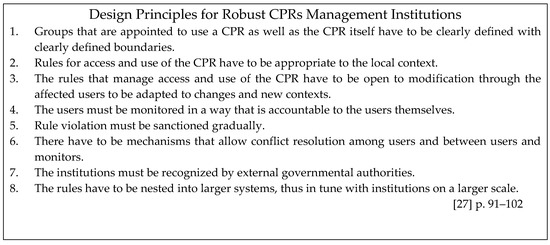
Figure 1.
Table of Design Principles for Robust CPR Management Institutions according to Ostrom [27].
Regarding the management of CPRs, a further question to be addressed is about who contributes to the provision of a CPR and who benefits from its use. A contribution can be active construction, maintenance work, or restraint in its use. According to Haller [12], Ostrom misses the point that the contribution to a CPR and benefits from it are not necessarily shared equally–this also applies in situations of robust management of CPRs. First, asymmetric power relations within a group using and managing a CPR can account for a management favoring powerful actors over others. Powerful actors can force weaker actors to accept an unequal distribution contribution to and benefits from a CPR. Weaker actors might have to accept an unequal cooperation instead of not benefiting from a CPR at all. Ensminger [10] has developed a useful model to include the role of power relations in the negotiation of rules and regulations that account for the management of CPRs (Figure 2). Secondly, the provision of a CPR can benefit or affect people that are not members of the group that directly uses or manages the resource. On the other hand, activities of actors not being involved in the management of a CPR can affect its quality. This shows that not all actors being affected by or affecting a CPR might be included in its management. Such indirect impacts are described as externalities in economic terms. Some of these externalities can be very vague and reach a global scale. This poses the question of whom should be included in the management of a CPR if externalities affect or are affected by a large group of actors.
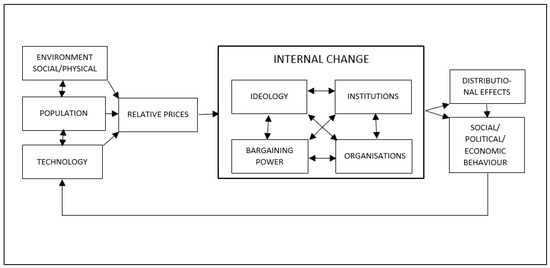
Figure 2.
Schematic figure for modeling change, according to Ensminger [11].
The expansion of food production for agro-industrial food systems is often accompanied by a fragmentation via state property and privatization of former cultural landscape ecosystems and CPRs that were important for food production in other food systems [9]. With the fragmentation of cultural landscape ecosystems and the privatization of property and user rights, interconnected systems are torn apart and the rights of marginalized actors are being suppressed. This leads to a marginalization of already marginalized actors engaging in other food systems [12,31] or in the context of the land grabbing debate [32].
1.1.2. Food Systems and Common Pool Resources
Food systems link a group or groups of consumers with actors that contribute towards the satisfaction of the food needs of these groups. In addition to satisfying food needs, food systems provide a range of other goods and services (see Figure 3). Such additional goods and services can be income opportunities, increases in biodiversity, CO2 sequestration or enhanced resilience. These goods and services benefit different actors of the food systems, and, more indirectly through impacts on the ecological and socio-economic environment, all people living on our planet [23]. Food systems rely on natural resources and affect their management. These natural resources include the atmosphere, freshwater, genetic diversity, soil, pollinators, land, etc. Some of these resources are managed through CPR institutions, others are managed by state or private property institutions. Lack of adequate management institutions results in open access constellation with no measures in place to prevent overexploitation. Different types of food systems tend to have different impacts on the management of natural resources and contribute differently towards their maintenance and availability. For a detailed description of food systems and their interlinks, see Figure 3.
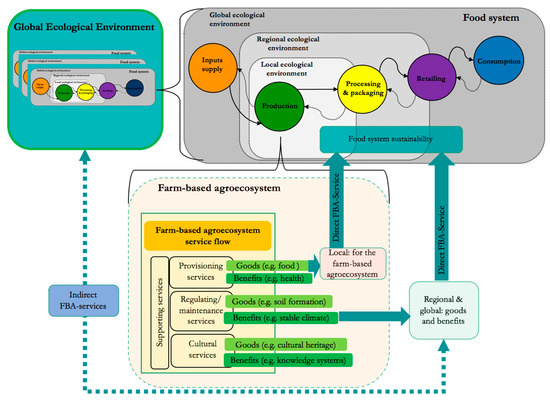
Figure 3.
Conceptual model of a food system. Food systems are part of the global ecological environment, and their activities depend on it and shape it at the same time. Based on references [23,33,34,35].
To link the theoretical sphere with practical issues, we show in the second part of this paper how different selected food systems contribute to the integrity of the global ecological environment and food sustainability.
2. Materials and Methods
2.1. The Agroecosystem Service Capacity (ASC) Approach
In this study, we use the ASC approach [23] to estimate the capacity of each land cover class to provide farm-based agroecosystem services and to calculate the ASC-index for the whole farm-based agroecosystem. Thus, we use the concept of farm-based agroecosystems to refer to farms, yet we assess them from a holistic perspective and study them as farm-based agroecosystems and compare their capacities to provide 23 farm-based agroecosystem services.
2.2. Study Area—The Food Systems
As previously mentioned, this paper is part of a larger research project that studies food systems sustainability in Bolivia and Kenya. The study regions are Santa Cruz in Bolivia and the north-western Mount Kenya region (specifically the counties of Meru, Nyeri and Laikipia in Kenya). The criteria for the selection of the study sites were as follows: (1) their importance for regional national food security, (2) the possibility of studying conflicts competition and synergies in the context of currently coexisting food systems, (3) the presence of rapid agrarian change leading to upheaval in local agricultural systems and activities and their impacts on the livelihood of local rural people, and (4) the possibility of drawing upon the previous research of Southern Partners [36].
The selection of the food systems to be investigated in each study region was guided by the following criteria: (1) their spatial, economic, social, and cultural relevance within the study region; (2) representation of all five-ideal typical food systems as defined by Colonna et al. [2] in the overall sample; and (3) coexistence of several food systems in the study regions, enabling investigation of the effects of their interactions [30]. Although there are deferent approaches to describe and assess food systems [33,37,38,39,40,41], Colonna et al. [2] provides a set of differentiating variables useful to draw borders between one food system and the other. Because of the aforesaid argument we use the five-ideal food systems described by Colonna [2]. The number of food systems was limited to six, and in each food system, we studied three farm-based agroecosystem, in accordance with the project’s human and financial resources [36].
Food System Main Characteristics
Table 1 describes the food systems according to the food system differentiating variables proposed by Colonna et al. [2]. It is important to mention that none of the food systems are purely one or the other. There are always influences from one food system onto another food system, because food systems are open systems with ill-defined and permeable boundaries. For analytical purposes, we draw conceptual boundaries between them. For a detailed analysis of the agroecological food system in Bolivia, see Schälle [42]. For a detailed analysis of an agro-industrial food system in Bolivia, see Augstburger et. al. [26]. For a detailed analysis of an indigenous food system in Bolivia, see Heusser [43]. For a detailed analysis of a local food system in Kenya, see Käser [44]. For a detailed analysis of a regional food system in Kenya, see Ottiger [45]. Finally, for a detailed analysis of an agro-industrial food system in Kenya, see Ngutu Peter [46].

Table 1.
Food system characteristics of the food systems in Bolivia and Kenya.
2.3. Study Sites and Methodology—The Farm-Based Agroecosystems
In each one of the six food systems, we selected three farms that we called farm-based agroecosystems to carry out the ASC assessment. In order to select three farm-based agroecosystems, we did introductory interviews with farmers of the different food systems in Bolivia and Kenya. For the interviews, we used semi-structured interviews in order to collect general data on their agricultural practices. To select the farmers that could be considered as representative samples, we used the purposeful sampling criteria of Palinkas, Horwitz [47]. From this process, we selected three farm-based agroecosystems for each food system (all briefly described in Table 2).

Table 2.
Main characteristics of farm-based agroecosystems.
2.4. The Agroecosystem Service Capacity Index
To compare the capacity that different farm-based agroecosystems have in providing farm-based agroecosystem services, we used the ASC-Index [23]. In a nutshell (see Figure 4), the ASC allows us to assess the capacity of each land cover class of a farm-based agroecosystem to provide 23 farm-based agroecosystem services (Table 1). Hence, the smallest units of analysis being compared are land cover classes. In order to implement the ASC, there are two major phases: data collection and data analysis.
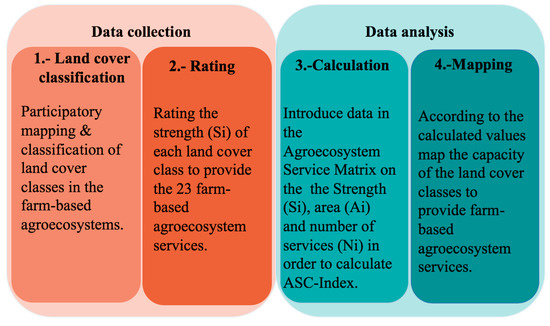
Figure 4.
The agroecosystem capacity index in nutshell based on Augstburger, and Rist [26].
Data collection:
- 1)
- Land cover classification: Identify the land cover classes of the farm-based agroecosystem under study. For this, we used participatory mapping approaches.
- 2)
- Land cover class description: Collect data on the capacity of each land cover class to provide the 23 farm-based agroecosystem services. For this, we used semi-structured interviews.
Data analysis:
For the analysis of the data, a central element of the ASC is the Agroecosystem Service Matrix (ASM) (Figure 5). The ASM centralizes all the information that is later required to calculate the ASC per land cover class and the ASC-index for the whole farm-based agroecosystem. The number of land cover classes (rows) in the ASM depends on the amount and type of land cover classes present in the farm-based agroecosystem. In the columns are the 23 farm-based agroecosystem services. The second row of the matrix provides the equations for the calculations in the corresponding column. The last column on the left is the equation to calculate the ASC per land cover class. The ASC-index is the sum of all ASCs depicted in the yellow box [23]. Below the total number of land cover classes is the row depicting the farm-based agroecosystem’s capacity to provide farm-based agroecosystem services.
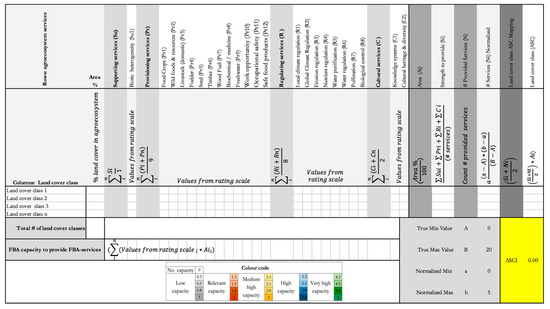
Figure 5.
Example of an empty Agroecosystem Service Matrix (ASM).
1) Fill in the ASM:
A key tool to create the ASM is the ASC rating scale that is provided in the paper that describes the ASC approach [23]. The rating scale is a scale that provide values between zero and five to rate the capacity of a land cover class in providing a specific farm-based agroecosystem service [23]. To fill in the ASM, two sources of information are needed: (i) the land cover classification and (ii) the land cover class description. The values of the rating scale are introduced in the ASM in the intersection of the land cover class and the agroecosystem service that is being assessed. This number later represents the strength (Si) that the land cover class has for providing agroecosystem services.
2) Figure 5:
3) Calculate the ASC-index
The ASC-index is calculated using three main elements: Area (Ai) that a land cover class occupies within the farm-based agroecosystem, the Strength (Si) that land cover class has in providing farm-based agroecosystem services and the number of services (Ni) that are provided by the land cover class (all the equations are available in Figure 5). On the right-hand side of the ASM are the equations used to obtain the values for each one of the aforementioned components. Each one of the components is then introduced in the equation to estimate the ASC per land cover class, the ASC-map, and finally the ASC-index for the whole farm-based agroecosystem. We added one row to the ASM on the bottom left below the total number of land cover classes. The row is the farm-based agroecosystems capacity to provide farm-based agroecosystem services; this row depicts the capacity of the whole farm-based agroecosystem to provide one specific farm-based agroecosystem service. This value can help us assess how the farm-based agroecosystem contributes or does not contribute to the commons that we previously defined (food system sustainability and the global ecological environment).
3. Results
3.1. The Agroecosystem Service Capacity of Food Systems
Table 3 shows a summary of the results of the application of the ASC in the different food systems in Bolivia and Kenya. The largest farm-based agroecosystem that we studied was the farm-based agroecosystem Reg-2 (with an area of 4200 ha), and the farm-based agroecosystem Lo-3 (with an area of 0.5 ha) was the smallest farm-based agroecosystem we studied. Interestingly, it is not the largest farm-based agroecosystem that has the highest ASC (ASC Reg-2 = 1.2). In economies of scale, there is the marginal cost (cost of producing one more unit), which is reduced by increasing the number of units produced. The opposite of what occurs with marginal costs in economies of scale seems to happen with the capacity to provide agroecosystem services—the larger the area, the lower the ASC. This is so because the farm-based agroecosystems that we have studied have large areas of operation practice monoculture or agriculture with little diversity in relation to the whole area that they manage within the landscape.

Table 3.
Area, number of land cover classes and agroecosystem services provided and CPR compliance of the 18 agroecosystems data for Bolivia [26].
3.2. Agroecosystem Service Matrix
Figure displays the ASM of one farm-based agroecosystem in each one of the six food systems (the ASM of the other farm-based agroecosystems are the annex). Each number in the ASM indicates the strength (Si) that each land cover class has in providing the specific farm-based agroecosystem service. Also, in the ASM are the Area (Ai) occupied by the land cover class within the farm-based agroecosystem and the number (Ni) of services provided. The three aforementioned elements are part of the equation to calculate the ASC capacity of each land cover class and the ASC-index of the whole farm-based agroecosystem. The ASC-map column has different colors. The color code in Figure 3 was used to assign colors to the land cover class according to the capacity of the land cover class to provide ASC services.
AgI-1B has the lowest ASC-index (0.89) and also the least number of land cover classes (5). AgI-1B has a low ASC-index, because it has five land cover classes in an area of 28 ha. Additionally, the land cover classes provide a total of 46 farm-based agroecosystem services (Table 3). In-1B has a medium ASC-index (2.12) and total of six land cover classes (only one more than the farm-based agroecosystem AgI-1B). However, In-1B has six land cover classes in an area of 3.6 ha. The land cover classes of In-1B can provide a total of 91 farm-based agroecosystem services (Figure 3). Ae-1B has the highest ASC-index (2.8) and also the highest number of land cover classes (12). Ae-1B has a high ASC-index, because it has 12 cover classes in an area of 3.9 ha. Additionally, the land cover classes provide a total of 141 farm-based agroecosystem services (Figure 6).
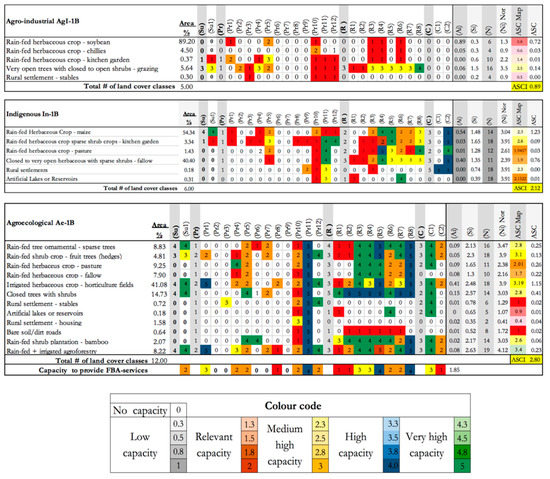
Figure 6.
Agroecosystem service matrix of three farm-based agroecosystems in Bolivia (modified from [26]).
For the farm-based agroecosystems of Kenya (see Figure 7), Reg-1K has the lowest ASC-index (1.48) and 12 land cover classes. Reg-1K has a low ASC-index, because it has 12 land cover classes in an area of 2532 ha. Additionally, the land cover classes provide a total of 76 farm-based agroecosystem services (Figure 7). AgI-1K has a middle ASC-index value (1.76) and 8 land cover classes in an area of 48 ha. Additionally, the land cover classes provide a total of 69 farm-based agroecosystem services (Table 4) Lo-1K has the highest ASC-index (2.12) with five land cover classes in an area of 2.9 ha. The land cover classes provide a total of 47 farm-based agroecosystem services (Table 4).
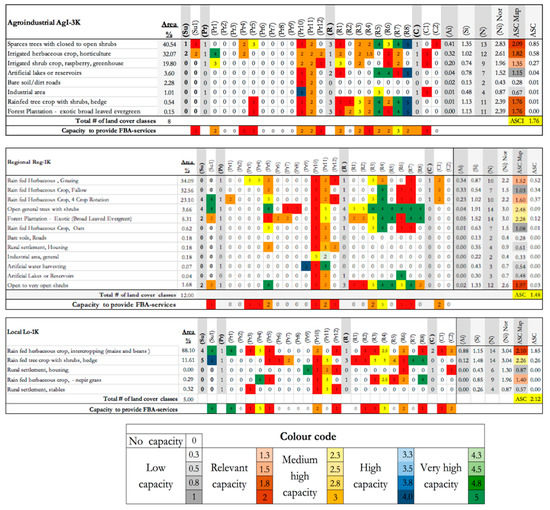
Figure 7.
Agroecosystem service matrix of three farm-based agroecosystems in Kenya.

Table 4.
CPR compliance assessment of six food systems.
Figure 8 shows the farm-based agroecosystem service index for the 15 farm-based agroecosystems that we studied. The farm-based agroecosystem of the Agroecological food system has the highest overall ASC-index capacity to provide farm-based agroecosystem services (Ae-1B = 2.80, Ae-2B = 2.39 and Ae-3B = 2.52). The farm-based agroecosystem of the Indigenous food system is second (In-1B = 2.12, In-2B = 2.47 and In-3B = 2.51). The farm-based agroecosystem of the Local food system is third, and the differences between its different farm-based agroecosystem is the highest (Lo-1K = 2.12, Lo-2K = 1.78 and Lo-3K = 1.47). The farm-based agroecosystem of the Agro-industrial food system are fourth in ASC values (AgI-1K = 1.59, AgI-2K = 1.64 and AgI-3K = 1.76). The fifth and lowest ASC values were identified in the farm-based agroecosystem of the Regional food system (Reg-1K = 1.48, Reg-2K = 1.33 and Reg-3K = 1.40). The overall lowest was identified in the Agro-industrial food system in Bolivia (AgI-1B = 0.89, AgI-2B = 0.74 and AgI-3B = 0.85).
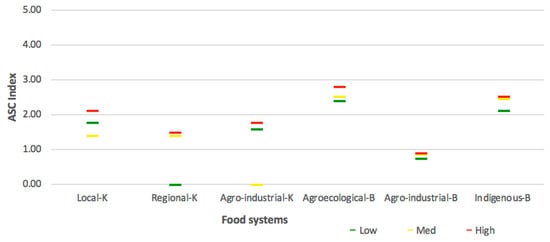
Figure 8.
Agroecosystem capacity index of 18 farm-based agroecosystems.
The farm-based agroecosystem with the highest capacity, Ae-1B = 2.8, has two times the capacity to provide farm-based agroecosystem services than Reg-2 = 1.33, and three times the capacity to provide farm-based agroecosystem services than AgI-1B = 0.89 (i.e., this means that an agroecological food system can be at least three times more beneficial to the contribution of the global environmental integrity availability than an agro-industrial food system). As such, the agroecological food system has a higher capability than the agro-industrial food system to contribute to the availability of a global common that is used by both food systems.
When comparing the capacity of the whole farm-based agroecosystem to provide specific agroecosystem services (last row on the bottom in Figure 6 and Figure 7), a new perspective comes to light. The farm-based agroecosystems with the highest ASC-index are the farm-based agroecosystems that can contribute more to the existence of the commons, food system sustainability and global ecological integrity. As can be seen in the last row of Figure 6, Ae-1B has values greater than one to provide 14 out of 23 farm-based agroecosystem services. In contrast, AgI-1B has a capacity to provide farm-based agroecosystem services greater than one for one farm-based agroecosystem service. In Kenya (Figure 7), AgI-3K has values greater than one for nine farm-based agroecosystem services. The lowest is for Reg-1K that has values greater than one for five farm-based agroecosystem services. When comparing all the farm-based agroecosystems in Bolivia and Kenya, we see that the most farm-based agroecosystem services are for Ae-1B.
Figure 9 illustrates the capacity of the farm-based agroecosystem to provide specific farm-based agroecosystem services. Interestingly, the agroecological and indigenous farm-based agroecosystems are skewed to the left (mostly regulating services), although they also have a relevant capacity to provide provisioning services. In both countries, most of the capacity for agro-industrial food systems to provide services is related to provisioning services.
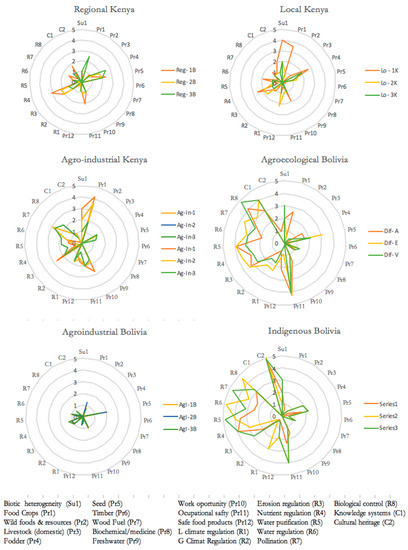
Figure 9.
Capacity of the farm-based agroecosystems to provide the 23 farm-based agroecosystem services.
3.3. Common Pool Resource Compliance Assessment Tool
Up to now, we have gained insights on the different ASC- index capacities of food system. We go one step further, and assess the relation between the ASC-index values and the contribution of food system towards a management of CPRs that complies with the eight principles of robust CPR management as proposed by Ostrom [27]. Certain food systems tend more towards fostering and depending on natural resources management as CPRs (e.g., indigenous food systems), whereas others lean more towards private property regimes and open access situations (e.g., agro-industrial horticulture operations).
The objective of the common pool resource assessment tool is to assess the relation between an ASC-index of the food system and the level of compliance of the resource’s management with the eight principles of robust CPR management proposed by Ostrom [21]. In order to develop this tool, the guiding question is: To what degree does the resources management of a food system comply with the principles of Ostrom?
For the construction of the assessment tool we proceeded as follows: First we listed the eight principles robust CPR management. Second, we assessed the degree of compliance of the food system’s resources management with each individual principle of Ostrom [27]. For that purpose we use the following ordinal scale: 0 = no compliance (e.g., dependence on private and state property regimes or open access constellations, contributing to transformations of CPRs to state or private property or open access), 1 = some compliance (e.g., dependence on private and state property regimes as well as CPR institutions or contribution towards a transformation of state and private property regimes or open access situations towards CPRs management) and 2 = full compliance (e.g., general dependence on CPRs and contribution towards a transformation of state and private property regimes or open access situations towards CPRs management). The CPRs compliance assessment relies on an analysis of selected literature on different food systems in the study area (see Table 4).
4. Discussion/Conclusions
Some food system activities, mostly production activities, that take place in farm-based agroecosystems have negative socio-environmental impacts. Yet food system activities have the capacity to provide multifunctional farm-based agroecosystems that can benefit local and global CPRs and their management. In this research we provide empirical data to compare the capacity of farm-based agroecosystems to provide farm-based agroecosystem services that belong to six typical food systems, as described by Colonna et al. [2]. The farm-based agroecosystems with the lowest ASC-indexes are the ones that are part of the agro-industrial food system. The farm-based agroecosystems of this food system are typical large-scale operations with few land cover classes, and hence have low ASC-index values. The farm-based agroecosystems with the highest ASC-indexes are those that belong to the agroecological food system. The farm-based agroecosystems of the agroecological food system can have an ASC-index up to two times that one of a regional food system (i.e., the farm-based agroecosystem of the agroecological food system provide two times more farm-based agroecosystem services to humans and nature than the regional food system).
Production activities of food systems that have a higher capacity to provide farm-based agroecosystem services also tend to contribute more to the management and maintenance of CPRs. As can be seen in Table 4, the food system with highest CPR compliance score (1.88) is the indigenous food system, and it also has the second highest ASC (2.37). It is not as high as the agroecological food system ASC (2.57) solely because in some cases farmers of this type of food system are using herbicides that degrade the capacity of the food systems to provide agroecosystem services. The agroecological food systems have the highest ASC (2.57), yet have the second highest CPR compliance (1.75). The agroecological food systems comply with fewer criteria of the CPR because most of the farm-based agroecosystems in this case are managed privately. The agro-industrial food system of Bolivia has the lowest overall ASC (0.87) and CPR compliance (0.63). The agro-industrial food system in Kenya has the lowest CPR compliance (1.00) and also has a low ASC value (1.12).
Generally, the main objective of a farmer managing a farm-based agroecosystem is to produce biomass, yet our results show that all farm-based agroecosystems have a capacity, not commonly brought to light, to provide other farm-based agroecosystem services (e.g., soil formation and climate regulation). ASC allows us to shed light on the potential of farm-based agroecosystems to provide farm-based agroecosystem services. The result also suggests that farm-based agroecosystems of food systems with high ASC-index values subsidize the farm-based agroecosystems that have low ASC-index values using farm-based agroecosystem services such as global climate regulation. The farm-based agroecosystem services with a low ASC-index are either subsidized by the farm-based agroecosystems with a high ASC-index today, respectively, through their contribution to global commons, or they are getting the subsidies from future generations that will not be able to receive services from these natural resources and ecosystems for their farm-based agroecosystem in the future. In other terms, farm-based agroecosystems with a low ASC-index grab farm-based agroecosystem services from farm-based agroecosystems with a high ASC-index or from future generations that today are deprived of their resource basis. As such, it can be said that a Bolivian farmer of an agroecological food system or a local farmer in Kenya that operates farms with an overall high ASC-index contributes to local and global commons and subsidizes food production for regional and global food systems that operate on farms with low ASC-indexes. Food production that depends on local and global commons without contributing much towards their availability grabs these global commons and prevents other food production that would contribute to local and global commons from operating in its place. In addition, the food systems grabbing from local and global commons often expand their production area at the expense of the food systems that contribute to local and global commons.
In addition, our results show that there tends to be a reduction in the ASC capacity of the farm-based agroecosystem when the size of operation of the farm-based agroecosystem is increased. This suggests that there is an environmental marginal cost that increases in large-scale operations where their marginal production costs are probably reduced by increasing the size of operation. The latter is because the larger the farm-based agroecosystem, the more land cover classes it has to have in order to have a “good” ASC-index. What normally happens is that the larger the operation, the lesser the land cover classes (hence, the lower the ASC-index).
Food production in agroecosystems that depend on and manage cultural landscape ecosystems through robust common property regimes, such as the indigenous and agroecological food system in Bolivia and partially the local food system in Kenya, have a higher ASC-index and contribute more towards ecological integrity and food sustainability. With the privatization and commodification of food production, cultural landscape ecosystems and CPRs became fragmented. Generally, commodified private food production of agro-industrial and regional food systems has a lower ASC-index and contributes less to ecological integrity and food sustainability.
Commodification, privatization and fragmentation has often occurred through transformation processes that were carried out in the name of development. Neo-liberal development discourses and a narrowed focus on food production only have veiled the commons grabbing coming along with the privatization and commodification of food production. As a result, these developmental discourses and narrowed foci on food production acted like an anti-politics machine as described by Ferguson [14].
Moreover, the privatization and commodification of food production not only result in commons grabbing but also the dominance of such food systems suppresses other food systems. This reduces their ability to provide the services of which they are capable. Ecological compensation areas or CSR measures of agro-industrial or regional farms neither enhance the ecological nor the social performance of agro-industrial food systems significantly. However, they are used to legitimize their operations. Therefore, this is just another anti-politics machine obscuring the negative impacts of such food systems.
The agroecological food system has the best ASC-index. An anthropological analysis of parts of this food system in Bolivia has shown that despite the good performance at farm level, other aspects of this food system prevent the participation of many marginal actors that could benefit from an inclusion [42]. This indicates that even with a comprehensive farm-based agroecosystem service analysis, not all aspects of the performance of a food system can be unveiled. Thus, even in such food systems, Ferguson’s anti-politic machines might be operating.
4.1. Limitations of the Research
The ASC-index is limited to an index, and it provides an overall indication of the capacity of a farm-based agroecosystem to provide farm-based agroecosystem services on a scale from zero to five. Thus, the results are not absolute values. The ASC-index values that we show are related to the capacity of the farm-based agroecosystems that belong to different food systems to provide farm-based agroecosystem services. In this case, the ASC does not assess the full food system (i.e., we did not assess the capacity to provide farm-based agroecosystem services of land cover classes such as retail infrastructure or agriculture input production units, which are common land cover classes of food systems).
The CPR compliance assessment is an explorative tool to assess how much a food system complies or does not comply with the eight principles of CPRs developed by Ostrom [27] (i.e., it is not a measure of the compliance). The intention with this tool was to be able to say food systems that are managed more as commons also provide more benefit to the global environmental integrity than a global common. In contrast, food systems that are managed under private property regimes consume CPRs and provide little or very little benefit to global environmental integrity as a global common.
4.2. Future Research
In the future, we need to find simple ways to operationalize food system sustainability and to bring in debates on regenerative food systems. The results provided by the ASC contribute to the debate on operationalizing the sustainability of food systems by showing how much more or less a food system can contribute to food system sustainability in terms of its capacity to provide farm-based agroecosystem services. The aforementioned contributes to the idea that the more farm-based agroecosystem services a farm-based agroecosystem can provide, the higher the environmental performance; hence, it can contribute towards food system sustainability. A way to operationalize food system sustainability using the ASC is to set a minimum ASC-index for the farm-based agroecosystem; hence, farm-based agroecosystems should shape their land cover classes in order to provide a diversity of farm-based agroecosystem services. This could be used for the instauration of a regulations that could promote farm-based agroecosystem that have a capacity to provide a range of services. This in contrast to the farm-based agroecosystem that we are promoting today, that only provide a small set of farm-based agroecosystem services for humans and none for the environment.
Standards for organic or sustainable agriculture have had a key role in making agriculture more sustainable, yet both can be further improved in the future. These standards tend to have a reductionist view on what the role of an agroecosystem is within a planetary system. An example of this is the case of organic quinoa production the Andes in southwest Bolivia. Although the produce is organic, its cultivation for the export markets has, in some cases, transformed natural vegetation into deserts [48]. Although the produce is organic it lacks an assessment of the capacity of the whole farm-based agroecosystem to provide farm-based agroecosystem services. This problem could be reduced by including the ASC-index in the standards of organic agriculture and good agriculture practices such as Global Gap; hence, the farm-based agroecosystem would be required to have a minimum ASC-index and provide a minimum of services/benefits to society and nature.
Today, the idea of recognizing Earth as a self-regulating system where each living and non-living organism plays a role has gained acceptance in the scientific community [16]. Moreover, a tragedy of commons can be avoided if CPRs are managed sustainably [27]. Both authors suggest that we have to evolve institutional and collective action to ensure a management of global CPRs that ensures a sustainable use of these commons. If we consider the planet as a self-regulating system, as suggested by Lovelock [16], where every land cover class has a role as well as every living and non-living organism, then it makes sense to assess the capacity of each of these land cover classes to provide benefits to the planet and society. If humans would change the role that is given to agricultural landscapes and instead of regarding them as production units we conceive them as farm-based agroecosystems that provide a set of farm-based agroecosystem services/benefits, then we could also appreciate the contribution of farm-based agroecosystems to local and global common pool recourses. Changing the role that is given to agriculture can be used as concepts in environmental education for the population in general.
A next step would be to link the ASC approach with incentives in the agricultural sector. An example of this, as suggested by Lant et al. and Brouwer and Lowe [49,50], involves shifting from single-purpose resource management to more holistic and integrated approaches and developing institutional subsidy frameworks that are based on agroecosystem services to increase provisions of farm-based agroecosystems such as water purification or soil conservation. Incentives could be monetary or other types of compensation for having farm-based agroecosystems that provide a larger set of farm-based agroecosystem services. This could help revert CPR grabbing and instead promote the provisions of CPRs.
Further applications of the ASC approach are needed in order to also have more empirical data to adapt the rating scale to different contexts. The ASC was developed and applied in very different farm-based agroecosystems in Kenya and Bolivia, yet it is necessary to apply the ASC in other places to improve the rating scale and make it adaptable to more diverse farm-based agroecosystems.
Author Contributions
Conceptualization, H.A., F.K. and S.R.; Data curation, F.K.; Formal analysis, H.A.; Investigation, H.A. and F.K.; Supervision, S.R.; Validation, S.R.; Writing—original draft, H.A. and F.K.; Writing—review & editing, H.A., F.K. and S.R.
Funding
This paper is part of the project “Towards food sustainability: Reshaping the coexistence of different food systems in South America and Africa”, under the Swiss Programme for Research on Global Issues for Development (R4D programme). As such, it is funded by the Swiss Agency for Development and Cooperation and the Swiss National Science Foundation [Grant number 400540_152033], with additional support from the Centre for Development and Environment (CDE), University of Bern, Switzerland.
Acknowledgments
This work would not have been possible if farmers in Bolivia and Kenya had not opened their doors and shared their time with us: we warmly thank them all. We also thank people from Agroecología Universidad Cochabamba (AGRUCO), Cochabamba, Bolivia; and the Centre for Training and Integrated Research in Arid and Semiarid Lands Development (CETRAD), Nanyuki, Kenya. Thanks to all project colleagues, friends, and family for sharing their time, contacts, knowledge, and experiences. Also the two anonymous reviewers for their valuable comments and suggestions.
Conflicts of Interest
The authors declare no conflict of interest
References
- International Assessment of Agricultural Knowledge Science and Technology for Development (IAASTD). Agriculture at a Crossroads: International Assessment of Agricultural Knowledge, Science and Technology for Development: Global Report; IAASTD: Washington, DC, USA, 2009. [Google Scholar]
- Colonna, P.; Fournier, S.; Touzard, J.-M. Food Systems. In Food System Sustainability: Insights from DuALIne; Esnouf, C., Russel, M., Bricas, N., Eds.; Cambridge University Press: Cambridge, UK, 2013. [Google Scholar]
- Foley, J.A.; DeFries, R.; Asner, G.P.; Barford, C.; Bonan, G.; Carpenter, S.R.; Chapin, F.S.; Coe, M.T.; Daily, G.C.; Gibbs, H.K.; et al. Global Consequences of Land Use. Science 2005, 309, 570–574. [Google Scholar] [CrossRef]
- Tilman, D.; Cassman, K.G.; Matson, P.A.; Naylor, R.; Polasky, S. Agricultural sustainability and intensive production practices. Nature 2002, 418, 671. [Google Scholar] [CrossRef]
- Altieri, M. Agroecología, Bases Cientificas de la Agricultura Alternativa, 1st ed.; Altieri, M., Ed.; Centro de Estudios en Tecnoligias Apropiada para America Latina: Santiago, Chile, 1983. [Google Scholar]
- Power, A.G. Ecosystem services and agriculture: Tradeoffs and synergies. Philos. Trans. R. Soc. B Biol. Sci. 2010, 365, 2959–2971. [Google Scholar] [CrossRef]
- Porter, J.; Costanza, R.; Sandhu, H.; Sigsgaard, L.; Wratten, S. The Value of Producing Food, Energy, and Ecosystem Services within an Agro-Ecosystem. AMBIO J. Hum. Environ. 2009, 38, 186–193. [Google Scholar] [CrossRef]
- Altieri, M. The ecological role of biodiversity in agroecosystems. Agric. Ecosyst. Environ. 1999, 74, 19–31. [Google Scholar] [CrossRef]
- Ellen, R. Environment, Subsistence and System: The Ecology of Small-Scale Social Formations; Cambridge University Press: Cambridge, UK, 1982. [Google Scholar]
- Haller, T. Understanding Institutions and Their Links to Resource Management from the Perspective of New Institutionalism. 2007. Available online: https://boris.unibe.ch/52831/1/Haller_NCCR_Dialogue_2.pdf (accessed on 22 April 2019).
- Ensminger, J. Making a Market: The Institutional Transformation of an African Society; Cambridge University Press: Cambridge, UK, 1992. [Google Scholar]
- Haller, T. The Contested Floodplain: Institutional Change of the Commons in the Kafue Flats, Zambia; Lexington Books: Lanham, MD, USA, 2013. [Google Scholar]
- McMichael, P. A Food Regime Genealogy. J. Peasant Stud. 2009, 36, 139–169. [Google Scholar] [CrossRef]
- Rostow, W.W. The Stages of Economic Growth. A Non-Communist Manifesto; Cambridge University Press: Cambridge, UK, 1960. [Google Scholar]
- Ferguson, J. The Anti-Politics Machine. Development, De-Politicisation and Bureaucratic Power in Lesotho; Cambridge University Press: Cambridge, UK, 1990. [Google Scholar]
- Lovelock, J. Gaia, The practical Science of Planetary Medicine; Oxford University Press: Singapore, 2000. [Google Scholar]
- Allen, T.; Prosperi, P.; Cogill, B.; Padilla, M.; Peri, I. A Delphi Approach to Develop Sustainable Food System Metrics. Soc. Indic. Res. 2019, 141, 1307–1339. [Google Scholar] [CrossRef]
- Lovell, S.T.; DeSantis, S.r.; Nathan, C.A.; Olson, M.B.; Ernesto Méndez, V.; Kominami, H.C.; Erickson, D.L.; Morris, K.S.; Morris, W.B. Integrating agroecology and landscape multifunctionality in Vermont: An evolving framework to evaluate the design of agroecosystems. Agric. Syst. 2010, 103, 327–341. [Google Scholar] [CrossRef]
- Huang, J.; Tichit, M.; Poulot, M.; Darly, S.; Li, S.; Petit, C.; Aubry, C. Comparative review of multifunctionality and ecosystem services in sustainable agriculture. J. Environ. Manag. 2015, 149, 138–147. [Google Scholar] [CrossRef]
- Manning, P.; van der Plas, F.; Soliveres, S.; Allan, E.; Maestre, F.T.; Mace, G.; Whittingham, M.J.; Fischer, M. Redefining ecosystem multifunctionality. Nat. Ecol. Evol. 2018, 2, 427–436. [Google Scholar] [CrossRef]
- Van Cauwenbergh, N.; Biala, K.; Bielders, C.; Brouckaert, V.; Franchois, L.; Garcia Cidad, V.; Hermy, M.; Mathijs, E.; Muys, B.; Reijnders, J.; et al. SAFE—A hierarchical framework for assessing the sustainability of agricultural systems. Agric. Ecosyst. Environ. 2007, 120, 229–242. [Google Scholar] [CrossRef]
- Majewski, E. Measuring and modelling farm level sustainability. Visegr. J. Bioecon. Sustain. Dev. 2013, 2, 2–10. [Google Scholar] [CrossRef]
- Augstburger, H.; Jacobi, J.; Schwilch, G.; Rist, S. Agroecosystem Service Capacity Index—A methodological approach. Landsc. Online 2019, 1–48. [Google Scholar] [CrossRef]
- Perfecto, I.; Vandermeer, J.; Wright, A. Nature’s Matrix: Linking Agriculture, Conservation and Food Sovereignty; Earthscan: New York, NY, USA, 2009. [Google Scholar]
- Burkhard, B.; Kroll, F.; Müller, F.; Windhorst, W. Landscapes’ capacities to provide ecosystem services—A concept for land-cover based assessments. Landsc. Online 2009, 15, 1–22. [Google Scholar] [CrossRef]
- Augstburger, H.; Jacobi, J.; Rist, S. Assessing the capacity of three Bolivian food systems to produce farm-based agroecoeystem services. J. Land Use Sci. submitted.
- Elinor, O. Governing the Commons: The Evolution of Institutions for Collective Action; Cambridge University Press: Cambridge, UK, 1990. [Google Scholar]
- Hardin, G. The tragedy of the commons. Science 1968, 162, 1243–1248. [Google Scholar]
- Netting, R. Of Men and Meadows. Strategies of Alpine Land Use. Anthropol. Q. 1972, 45, 132–144. [Google Scholar] [CrossRef]
- Dietz, T.; Ostrom, E.; Stern, P.C. The struggle to govern the commons. Science 2003, 302, 1907–1912. [Google Scholar] [CrossRef]
- Peters, P.E. Challenges in Land Tenure and Land Reform in Africa. Anthropological Contributions. World Dev. 2009, 1317–1325. [Google Scholar] [CrossRef]
- Locher, M.; Bernd, S.; Bishnu, R.U. Land Grabbing, Invesment Principles and Plural Legal Orders of Land Use. J. Legal Plur. Unoff. Law 2012, 44, 31–63. [Google Scholar] [CrossRef][Green Version]
- Ericksen, P. Conceptualizing food systems for global environmental change research. Glob. Environ. Chang. 2008, 18, 234–245. [Google Scholar] [CrossRef]
- Burkhard, B.; Kroll, F.; Nedkov, S.; Müller, F. Mapping ecosystem service supply, demand and budgets. Ecol. Indic. 2012, 21, 17–29. [Google Scholar] [CrossRef]
- Haines-Young, R.; Potschin, M. Common International Classification of Ecosystem Services (CICES): Consultation on Version 4, August–December 2012. Available online: https://cices.eu/content/uploads/sites/8/2012/07/CICES-V43_Revised-Final_Report_29012013.pdf (accessed on 13 November 2017).
- Rist, S.; Jacobi, J. Selection of Food Systems in Bolivia and Kenya and Methods of Analysis; Towards Food Sustainability Centre for Development and Environment (CDE): Bern, Switzerland, 2015. [Google Scholar]
- Horst, M. Changes in Farmland Ownership in Oregon, USA. Land 2019, 8, 39. [Google Scholar] [CrossRef]
- Wilson, G.A.; Burton, R.J. ‘Neo-productivist’agriculture: Spatio-temporal versus structuralist perspectives. J. Rural Stud. 2015, 38, 52–64. [Google Scholar] [CrossRef]
- Food and Agriculture Organization of the United Nations. SAFA, Sustainability Assessment of Food and Agriculture Systems Indicators. Available online: http://www.fao.org/fileadmin/templates/nr/sustainability_pathways/docs/SAFA_Indicators_final_19122013.pdf (accessed on 5 May 2015).
- Duru, M.; Therond, O.; Fares, M.h. Designing agroecological transitions; A review. Agron. Sustain. Dev. 2015, 35, 1237–1257. [Google Scholar] [CrossRef]
- Rastoin, J.-L.; Ghersi, G.R. Le Système Alimentaire Mondial; Quæ: Versailles, France, 2010. [Google Scholar]
- Schälle, J. Agroecology as the Alternative for Peasants? A Food System Analysis of a Repeasantization Process in Santa Cruz, Bolivia; University of Bern: Bern, Switzerland, 2017. [Google Scholar]
- Heusser, T. El Maíz Era La Vida. The Influece of Institutions and Stakeholders on the Food System of a Garaní Community in Bolivia; University of Bern: Bern, Switzerland, 2017. [Google Scholar]
- Käser, F. Ethnography of Peasant Engagement in Food Systems; University of Bern: Bern, Switzerland, submitted.
- Ottiger, F. Resource Use Intensity in Different Food Systems in the Mount Kenya Region; University of Bern: Bern, Switzerland, 2018. [Google Scholar]
- Ngutu Peter, M. An Anthropological Study of Large-Scale Export Oriented Horticulture in North WEst of Mount Kenya; University of Nairobi: Nairobi, Kenya, 2018. [Google Scholar]
- Palinkas, L.A.; Horwitz, S.M.; Green, C.A.; Wisdom, J.P.; Duan, N.; Hoagwood, K. Purposeful Sampling for Qualitative Data Collection and Analysis in Mixed Method Implementation Research. Admin. Policy Ment. Health Ment. Health Serv. Res. 2015, 42, 533–544. [Google Scholar] [CrossRef]
- Jacobsen, S.-E. The Situation for Quinoa and Its Production in Southern Bolivia: From Economic Success to Environmental Disaster. J. Agron. Crop Sci. 2011, 197, 390–399. [Google Scholar] [CrossRef]
- Lant, C.L.; Ruhl, J.B.; Kraft, S.E. The Tragedy of Ecosystem Services. BioScience 2008, 58, 969–974. [Google Scholar] [CrossRef]
- Brouwer, F.; Lowe, P. CAP Regimes and the European Countryside: Prospects for Integration between Agricultural, Regional, and Environmental Policies; CABI: Wallingford, UK, 2000. [Google Scholar]
© 2019 by the authors. Licensee MDPI, Basel, Switzerland. This article is an open access article distributed under the terms and conditions of the Creative Commons Attribution (CC BY) license (http://creativecommons.org/licenses/by/4.0/).

